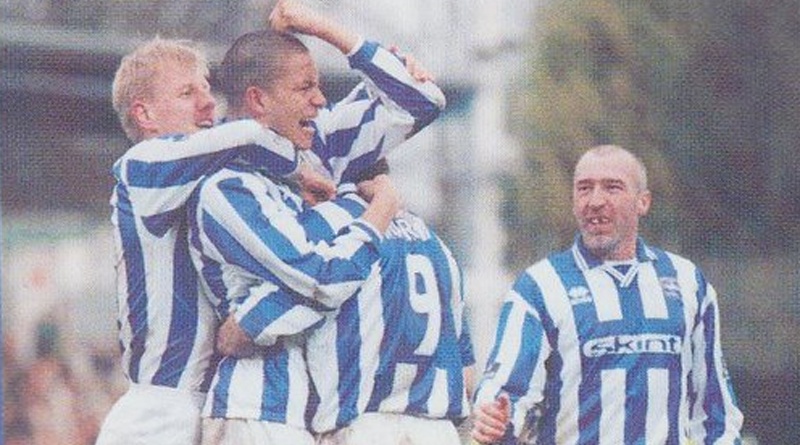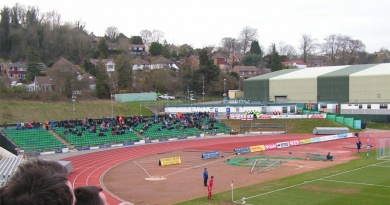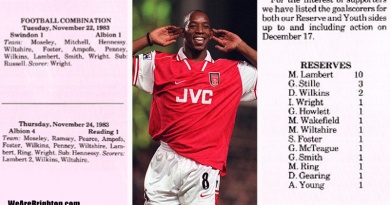What happened to the team from Bobby Zamora’s Brighton debut?
Saturday 12th February 2000. Withdean Stadium. A Nationwide League Division Three game between Brighton and and Plymouth Argyle that would been completely unremarkable were it not for a 19-year-old striker signed on loan from Bristol Rovers who was making his first Albion appearance. Yes, it’s Bobby Zamora’s Brighton debut.
Little did we know at the time that we were watching the very first steps in the Seagulls career of a many who would go on to be arguably the best ever striker the club have had.
Zamora had been signed just 24 hours earlier – and only because Lorenzo Pinamonte had turned down a permanent move to Withdean from Bristol City in favour of moving to Brentford.
It’s funny how these things work out, isn’t it? Had the Bees not gazumped us for Pinamonte, there probably would have been no Zamora. No talismanic striker to fire us to back-to-back championships. How different would the 21st century history of the Albion look without Zamora?
Not that Bobby Zamora’s Brighton debut got off to the best of starts. Within 60 seconds – and probably before Zamora had even touched the ball – Plymouth were 1-0 ahead through Martin Gritton. Zamora famously got the equaliser four minutes after half time, the first of his 89 goals for the club.
The 13 other players used by Micky Adams that day were an interesting mix; some would go onto star alongside Zamora as the Albion swept their way effortlessly through Divisions Three and Two. Others you’ve probably forgotten even existed.
Which is why we are here to remind you. Here’s what happened to the team from Bobby Zamora’s Brighton debut.
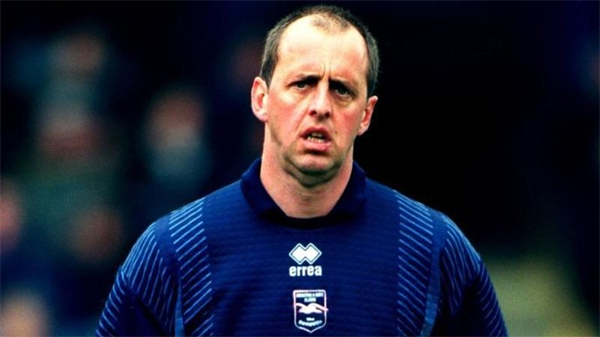
Mark Walton
Mark Walton had two seasons with the Albion in which he lost a lot of hair, even more weight and made very few friends. He was quite harshly treated by some sections of the Albion fan base – the Dale Stephens/Adam Webster/Pascal Gross thing has always gone on with Brighton supporters – to the point where he’d actually handed in a transfer request a few months before Zamora rocked up at Withdean.
Walton was persuaded to withdraw the request after winning a ding-dong battle with Mark Ormerod for the number one shirt. It looked like he was set for a rosy future with the Albion when he verbally agreed a new deal with Adams in the summer of 2000, only to renege on it and walk out on a free transfer for Cardiff City.
Adams was furious but this actually worked out quite well. For Zamora wasn’t the only player signed permanently from Bristol Rovers ahead of the 2000-01 season – Adams also raided the Memorial Stadium for a certain Michel Kuipers.
Brighton and Kuipers ended up beating Walton and Cardiff to the Division Three title a year later. Zamora meanwhile seemed to score against Walton and his successors in the Bluebirds goal every time we faced them from then on – to the point that Cardiff tried to sign Zamora on three separate occasions with bids of over £1 million. Unheard of then and even now in the bottom two divisions of English football.

Paul Watson
Paul Watson would be the man with whom Zamora would end up having a near-telepathic link with over the next three-and-a-bit years that they spent at the Albion together. Whenever you saw Watson standing over a free kick with that left foot made of silk of his, you always knew something magic was going to happen.
Normally, that was a goal. The sight of Watson curling a set piece into the exact spot where Zamora would be making his run was one of the most beautiful things about watching the Albion rise through the divisions, with Watson assisting more of Zamora’s goals than any other player during Zamora’s Brighton career.
And speaking of Brighton careers, Watson didn’t have a bad one himself. In six years, he racked up 221 games and scored an impressive 19 times from right back. Watson can now be found as Head of Medical at Sheffield United. It wouldn’t be a surprise to find out that he’s passed on a few pointers to Oliver Norwood and the rest of the Blades’ set piece takers.
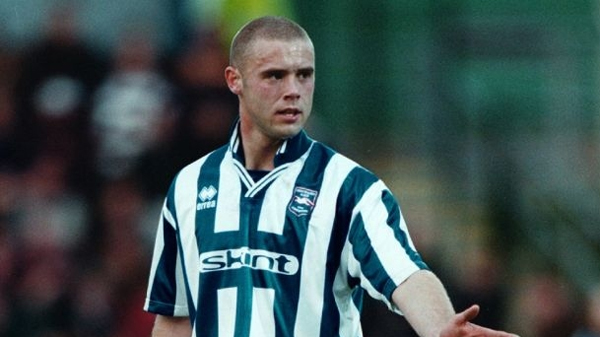
Danny Cullip
It says much about Bobby Zamora’s character that even when making his Brighton debut at 19, he slotted seamlessly into a side of big personalities. One of the chief among those was of course Danny Cullip, a man who had marked his own Albion debut against Chester City five months earlier with a performance full of barked instructions and cries of “LET’S ‘AVE A WINNER’ that instantly marked him out as a future captain.
Cullip would of course go onto live up to those predictions and more. He won three promotions with Brighton, including as the only player to captain the club to victory in a play off final when Mark McGhee’s side beat Bristol City 2-0 at the Millennium Stadium.
Cullip had nearly as many great moments in a Brighton shirt as Zamora, ranging from scoring the goal which secured the Division Three title against Chesterfield in 2001 to a collosal showing away at Nottingham Forest in 2004 in which he ended the game with blood pouring from his head.
The best though was undoubtedly when he screamed at Robbie Pethick “PETHICK YOU FUCKING UGLY BASTARD” so loud that the whole of Withdean could hear it. Pethick’s crime? Putting the ball out for a throw.
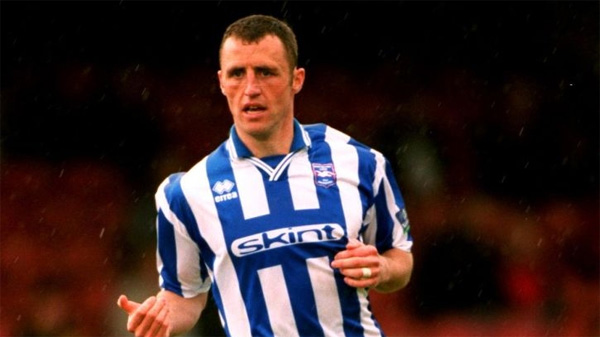
Andy Crosby
By the time that Bobby Zamora’s Brighton debut arrived, Andy Crosby had been a mainstay of the Albion defence for nearly seven months. He was your archetypal Adams player – a classic, no-nonsense defender around whom you could build a reliable team. Crosby and Cullip was a formidable back line.
Crosby had cost £10,000 the previous summer from Chester and that proved to be money well spent. He played 41 times in the 1999-00 season and followed that up with 39 appearances the following season as part of the Division Three title winning side.
Long before Inigo Calderon was scoring goals with his face, Crosby was doing so with his ear, netting what proved to be the winner in a 1-0 success over Blackpool at Withdean.
Simon Morgan’s arrival in the summer of 2001 proved to be the end of Crosby’s Brighton career and after 85 games, he left for Oxford United before joining Scunthorpe United.
It was at Glanford Park that Crosby first encountered Nigel Adkins and the two have been pretty much inseparable since, with Crosby serving as assistant to everyone’s favourite David Brent tribute act at the Irons, Southampton, Reading, Sheffield United and Hull City.
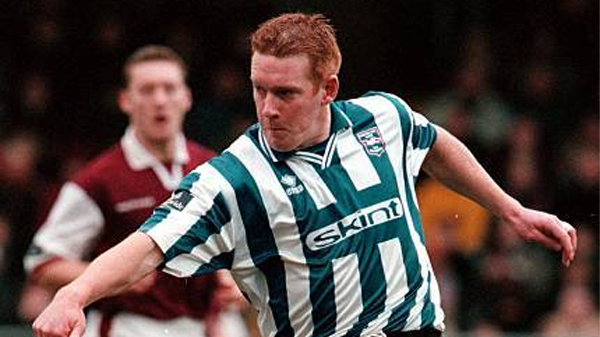
Kerry Mayo
It often gets forgotten that for the first half of the 1999-00 season, Adams persisted with the abomination that was playing Jamie Campbell at left back with Kerry Mayo either sat in the stands or coming off the bench as a central midfielder. Every Brighton fan could see that Campbell was woeful. And yet it took a ridiculous red card after just 25 minutes away at Swansea City two months prior to Zamora’s Brighton debut to open Adams’ eyes.
Campbell’s indiscretion was made even better by the fact that a flu bug had swept through the ranks for the game at the Vetch Field. 17-year-old’s Shaun Wilkinson and Chris McPhee were in the squad as a result and the last thing that the Albion needed was to have to play against that season’s eventual champions for the majority of the game with 10 men.
Campbell’s suspension created an opening for Mayo and he duly took it, going onto become one of the first names on the team sheet for Adams, Peter Taylor and Steve Coppell. Mayo’s final Brighton career reads 412 games spread over 13 years with three promotions thrown in for good measure.
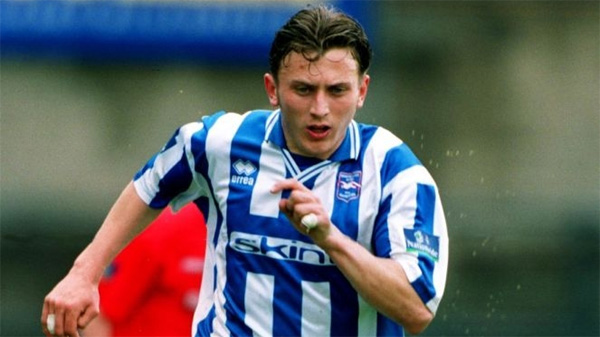
Gary Hart
Oh Gary Hart. He had begun 1999-00 as a centre forward but as the season progressed, Adams gradually decided that his pace and directness could be better utilised out on the right wing. That’s another reason why more firepower in the form of Zamora was required.
It was from Hart’s newfound position out on the right that he provided the assist for Zamora’s debut goal. Hart charged to the byline with his head down before hanging up the perfect cross to the back post. Zamora leapt like the proverbial salmon and directed his header low into the ground and under the body of Plymouth goalkeeper Jon Sheffield.
Hart and Zamora would develop a fruitful relationship over the next three years. They would also be the only two players from Bobby Zamora’s Brighton debut to turn out for the Albion at the Amex – albeit in Hart’s case, only in a Sussex Senior Cup Final.
That was his final appearance for the club after 12 years, a club-record four promotions, 417 games and 46 goals. He was also the only Albion player to play for the club in every season at Withdean.
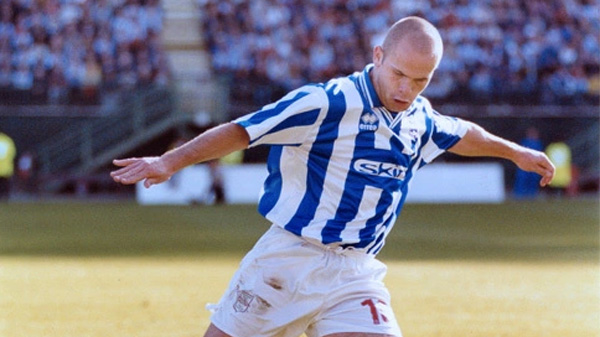
Charlie Oatway
Another big character who Zamora would have met on his first day with the Albion was Charlie Oatway. The tenacious midfielder had signed the previous summer from Brentford for £10,000, an astonishing piece of business even before you take into account the fact that the price included Watson as well.
Oatway would play 248 times for the Albion, becoming club captain and winning three promotions with the club in the process. He struck up a great relationship with Zamora during their time as teammates, and as a life-long Queens Park Rangers fan, Oatway probably appreciated more than most the goal that Zamora scored in the final minutes of the 2014 Championship Play Off Final to fire QPR to promotion at the expense of Derby County.
A broken ankle forced Oatway into retirement in 2007 but his Albion story wasn’t done as he returned to the club as first team coach under Gus Poyet. We were lucky enough to bump into Oatway in a Brighton pub just before Christmas, when he said that he won’t even look out for the Albion’s results now because of the way that he was treated when the club sacked Poyet.
Whatever your views on how things ended between the Albion and Poyet, it’s sad to think that a genuine club legend and former captain like Oatway feels that way.
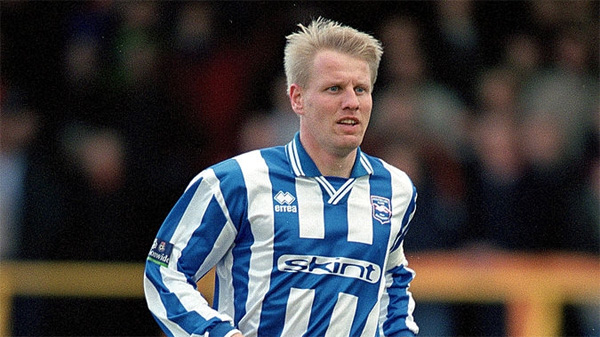
Paul Rogers
It says much about Paul Rogers that in a team which Adams was determined to pack with as many leaders as possible, it was Rogers who was signed to captain the side. Which makes him the first Brighton captain that Zamora would serve under.
There was an age gap of 16 years between Rogers and Zamora, which makes it even more remarkable that both players were still at the club when Zamora wore the Albion captain’s armband for the first time two-and-a-half years on from this Plymouth game. That came two divisions higher up the pyramid against Sheffield United, a reminder of how far Zamora’s goals helped Brighton climb.
Rogers was 35 when Zamora made his Brighton debut but it is testament to how fit he was even at that age that he missed just two league games in the 1999-00 and 2000-01 seasons combined. He retired at the end of the 2002-03 season after 139 appearances and 16 goals, taking up a position in the club’s marketing department as part of Dick Knight’s ‘Jobs for the Boys’ policy.
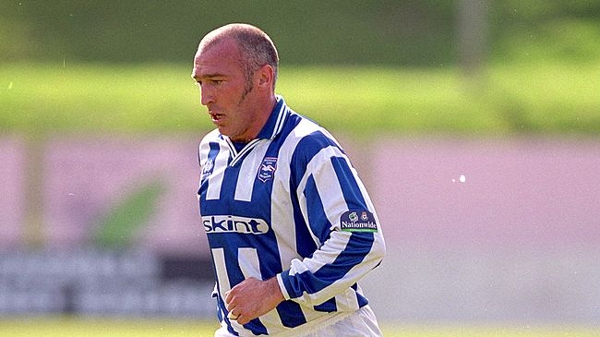
Warren Aspinall
Warren Aspinall had signed for Brighton from Colchester United in a swap deal with Andy Arnott going the other way a few weeks into the 1999-00 season and although he only played 37 times for the Albion, this proved to be a good bit of transfer business from Adams.
Aspinall was a familiar face to lower league football fans. He’d had something of a nomadic career but was capable of quality moments, not least when he came to the Goldstone with Carlisle United and ran the length of the pitch, beating about eight or nine Brighton shirts to score one of the best goals the old ground ever saw.
Following Bobby Zamora’s Brighton debut, Aspinall would play only 12 more games before he retired after an ankle injury. He’s been very open about the alcoholism and gambling problems which he suffered following his retirement and which led to him nearly committing suicide.
Something of an inspiration these days, Aspinall can now be found on BBC Sussex analysing Albion games alongside Johnny Cantor. His forthright and honest views on games are a refreshing change from the positive PR that most local radio stations chuck out in order not to upset their club.
Darren Freeman
Zamora’s first Brighton strike partner was Darren Freeman who was enjoying his first season with his hometown club. It had begun in the most sensational style imaginable of course, a hat-trick on his debut against Mansfield Town as the Albion returned to the city after two years playing ‘home’ games in Gillingham.
There were other great moments. He’d scored the first goal of the Millennium by a professional in the Albion’s 4-2 win over Exeter City a little over a month before Bobby Zamora’s Brighton debut. And there were some lows too – namely when he managed the impressive feat of getting sent off twice in the space of four games in November.
It wasn’t indiscipline but injuries which ultimately did for him and after 62 games, his Brighton career was over. He’s since gone onto have a decent managerial career on the Sussex non-league circuit as boss at Whitehawk and Lewes whom he left late last year. He sports substantially less hair these days than when he was a player.
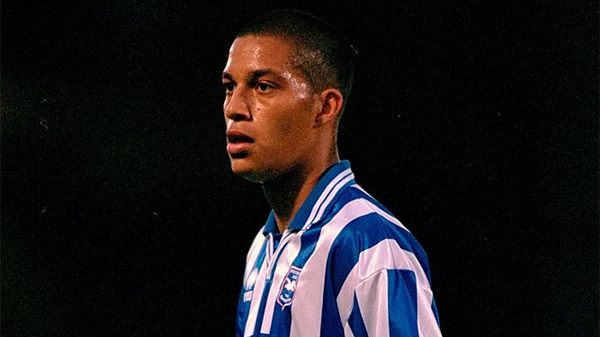
Bobby Zamora
The main man himself. The Zamora who made his Brighton debut against Plymouth was a stick-thin, lightning quick striker. He looked like he was drowning in his Albion shirt, a far cry from the chiselled target man who would end up returning to the club some 15 years later for one final swansong.
Zamora’s first goal for Brighton was a sign of what was to come. Five more followed during his initial loan spell, including a sensational hat-trick in a 7-1 demolition of Chester City two weeks later. It’s hard to recall a player who has had such an impact in such a short, temporary spell with the club.
As a result, Brighton just had to sign him. For most of the summer it was all anyone could talk about until Adams finally got his man when Knight managed to club together £100,000 to bring Zamora to Withdean permanently.
31 goals followed in the 2000-01 Division Three title winning season. Another 31 in the 2001-02 Division Two title winning season – a campaign in which he surely would have broken Peter Ward’s record of 36 in a single season had he not sat out several games through injury and suspension.
Zamora did set club records; no other player has scored in 10 consecutive game. No player has scored over 30 goals in back-to-back seasons. Two pieces of history that are unlikely to ever be rewritten unless the Albion fall back to a level where a striker can dominate as Zamora did.
Nobody could begrudge him his big move to the Premier League, which eventually arrived at the end of the 2002-03 season with Tottenham Hotspur. It might not have worked out there quite as anyone hoped, but Zamora went onto score winning goals in Championship play off finals for West Ham United – the team he supported as a boy – and QPR. He also played for England.
The Amex generation of fans got to experience the Zamora love when he came back to the Albion in August 2015, netting seven more times as Chris Hughton’s side just fell short of promotion. Zamora retired at the end of that campaign, safe in the knowledge that he will always be considered on a par with Ward as Brighton’s best ever striker.
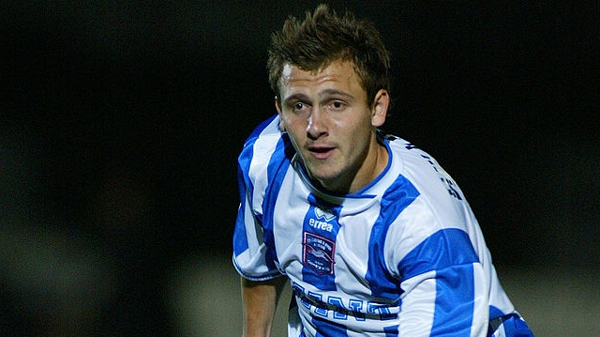
Shaun Wilkinson (Aspinall 50)
17-year-old Wilkinson made his second appearance as a Brighton player in Bobby Zamora’s debut, coming off the bench five minutes after half time for Aspinall.
Wilkinson ended up making five starts and 13 substitute appearances for the Albion, with all those starts coming after Martin Hinshelwood was forced into playing him and Dan Marney as a strike partnership in the second tier due to a lack of new signings and injuries to Zamora and Paul Kitson.
Wilkinson certainly proved to be the better of Hinshelwood’s two young forwards, although that isn’t saying much. He scored a cracking goal against Exeter at Withdean in a League Cup second round tie in 2002, although that was about as good as it got.
Wilkinson went onto play for Chesterfield, Havant & Waterloovile and Lewes. According to Google, he has had a glut of assistant manager rules with various Non League sides around Hampshire in recent times.
Rod Thomas (Freeman 73)
Rod Thomas was the People’s Player, bought in October 1998 by Brian Horton for £17,000 from Chester using money raised by supporters who had contributed to the Buy a Player fund.
Really, Thomas was exactly the sort of signing that fans’ hard earned cash should be going on. He was a maverick, a skilful entertainer and somebody who could get people on their feet with a piece of magic every time he had the ball.
While that may have been what Horton wanted, it certainly wasn’t what Adams wanted. The writing was on the wall almost from day one and although Thomas did score in the Withdean homecoming against Mansfield, it proved to be his final goal in a Brighton shirt.
It was in fact the return game with the Stags which had taken place 11 days before Zamora’s Brighton debut that had a much greater bearing on his Albion career as he managed to get sent off at Field Mill after just five minutes of a 1-0 defeat.
Adams was apoplectic with rage afterwards and their already strained relationship was as good as done. These being the days when suspensions kicked in two weeks after the offence, Zamora’s Brighton debut was Thomas’ final match before he served his three game ban.
Adams signed Paul Brooker on loan from Fulham ahead of the following week’s 1-0 defeat at Northampton Town and Thomas played just nine more time for Brighton in the next 18 months as his Brighton career came to an end with a record of four goals in 56 appearances.
He retired upon his release from Withdean and has since gone onto help his brother running salsa and comedy workshops, which sounds like a bloody brilliant job.
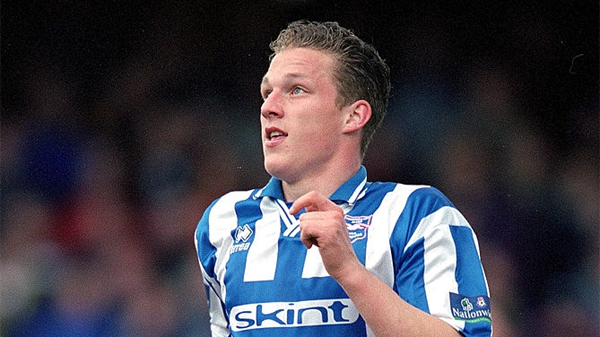
Scott Ramsay (Zamora 74)
Brighton have a long line of players who have scored goals for fun in the youth team and reserves but struggled with the step up to senior football. Scott Ramsay is one of the more forgettable, which is odd given that during his 37 game Albion career he remained popular with supporters.
Ramsay came off the bench for Zamora in the 74th minute of Zamora’s Albion debut and when Zamora’s loan spell came to an end five games later, it was Ramsay who was charged with replacing the prolific striker. In his second game leading the line following Zamora’s return to Bristol Rovers, Ramsay actually managed to score a brace in a 5-2 Withdean win over Macclesfield Town. Bobby who?
Those two goals ended up being his only two in Brighton colours. He went onto play for Dover, Eastbourne Borough and Hasting United before dropping onto the County League circuit with Rye United.
Ramsay retired at the end of the 2017-18 season as a 37-year-old playing for Westfield at level 11 of the English football pyramid with his final game coming against Rustington. A man who just loved playing football.

